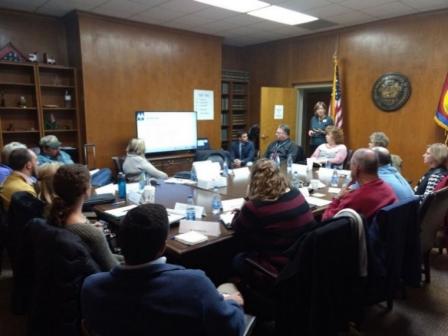Archived Content
This site contains information that has been considered archived and will no longer be updated.
The University of Tennessee Helps Rural Communities Realize Untapped Assets
The University of Tennessee University Center (UTUC) has created an innovative planning process to assist local communities in realizing their economic potential. The UT Asset-Based Planning Program is specifically designed to identify all available assets and opportunities in order to best promote economic development.
Through the Asset-Based Planning Program, UTUC is partnering with two economic development organizations through this initiative – both the Tennessee Development Districts Association (TDDA) and Tennessee Economic and Community Development (TNECD) are committed to revitalizing local communities through economic development and quality-of-life services.

Brainstorming assets and opportunities in Carter County, Tennessee
Brainstorming assets and opportunities in Carter County, Tennessee
This partnership initiative began in 2016 with 44 at-risk counties, and today services 79 counties across the state. UTUC has conducted 142 planning sessions with a variety of community stakeholders, which have identified key community interests. In response, TNECD has awarded 105 competitive grants totaling more than $4.6 million to support these economic development plans. They have also incorporated this initiative into Tennessee’s ThreeStar Program, promoting economic and community prosperity across the state.
TNECD Deputy Assistant Commissioner Brooxie Carlton indicated the program's success was evident by “the request from participating communities to expand it across the state and to institutionalize it in the ThreeStar Program.” She added that the program “has helped communities focus on their greatest assets and develop specific steps and projects to help them build off those assets. The grant program then allows them to develop projects that fit them the best.”
The forums pointed to a variety of projects that were deemed both feasible and practical, including expanding broadband capacity, promoting tourism, improving industrial sites, and enhancing historic attractions and educational opportunities.
Claiborne County, Tennessee, which boasts the beautiful Powell River, is a great example of how these discussions and collaborations come to fruition. The Powell River is a valuable asset that the county was previously underutilizing. Through these brainstorming sessions, a project to improve public access to the Powell River for fishing, paddling, and tourism was born, thus contributing to the economy’s growing ecosystem.

In reflecting upon the forums and the value of the program in general, Rena Purdy, Executive Director of the Wayne County Joint Economic & Community Development Board (JECDE), expressed that the “sessions brought key players together and gave us a better understanding of what each community and the county as a whole was interested in pursuing.”
Beth Phillips, Director of UT CIS Economic Development, also noted the benefits of community involvement in achieving tangible outcomes. “The results and the feedback from the communities we’ve served through this program have been very impactful and positive,” Phillips said. “It’s rewarding to see the asset-based planning process used in the state’s ThreeStar Program, and we are excited about opportunities to apply this approach to other strategic planning initiatives.”
To learn more about asset-based planning and hear two counties tell their success stories, check out this video by UT Center for Industrial Services.
